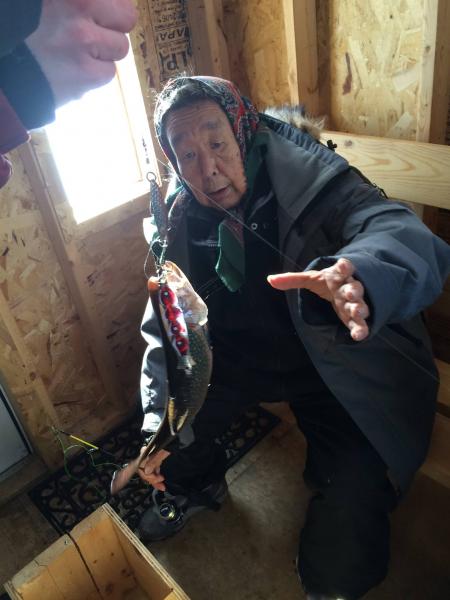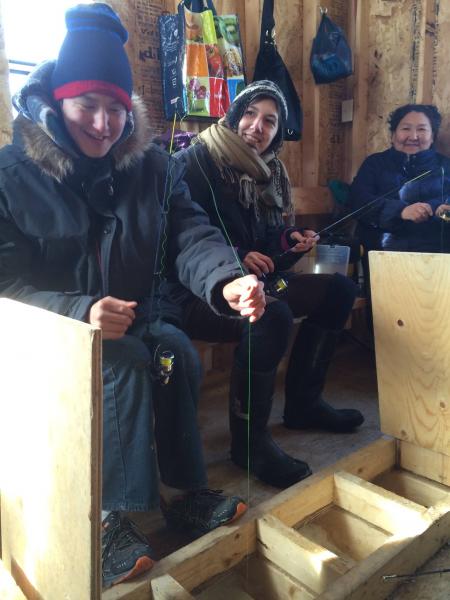Submitted by admin on
Pour nous médiateurs, les ateliers idAction sont une éternelle boîte à surprises, une grande source de défis et apprentissages tant du point de vue humain que professionnel. La semaine dernière, je crois que nous avons atteint des sommets dans ce domaine, avec un atelier de médiation intellectuelle et culturelle autour d’une partie de pêche sur glace avec des Inuit en milieu urbain.
Depuis octobre 2014, nous organisons des ateliers idAction au Module du Nord Québécois (MNQ). Les participants sont des Inuit du Nunavik en visite médicale à Montréal, et nos ateliers visent à faciliter leur inclusion sociale lors de leur séjour. Même s’ils connaissent la ville, même s’ils y sont déjà venus plus d’une fois, les résidents du MNQ ne trouvent pas toujours leur compte dans la grande ville. En séjour obligé pour des raisons de santé, ils attendent patiemment leur retour à la maison, à leur vie familiale et communautaire, aux grands espaces du Nunavik, la mer, les rivières, les lacs, les montagnes, la toundra… la chasse et la pêche. Mais Montréal n’est-elle pas une île dont l’occupation fut, pour la plus longue période de son histoire, celle des autochtones à des fins de pêche sur le fleuve Saint-Laurent? Nous, Montréalais, semblons l’ignorer ou du moins, l’avoir oublié.
« Nous étions préparées à apprendre lors de cette sortie »
C’est avec ces idées en tête que nous avons organisé un après-midi de pêche blanche dans le Vieux-Montréal avec des résidents du Module du Nord. Découvrir Montréal autrement, prendre l’air, échanger, avoir du plaisir en discutant… et en pêchant la truite mouchetée.
Avec mes collègues médiatrices, nous étions préparées à apprendre lors de cette sortie. Première leçon : chez les Inuit, la pêche est autant (sinon plus) une affaire de femmes que d’hommes. La majorité des participants à notre sortie furent donc des participantes. Marie-Paule Grimaldi, médiatrice, raconte : « Il y a eu un très beau moment au début, quand le garçon [le seul participant masculin, un jeune homme dans la début vingtaine] a insisté pour que Sarah [une aînée] commence la pêche. On la regardait faire, et il y a eu comme un petit moment de sacré empreint de respect pour elle, en silence et en attention. »

La belle prise! (c) Exeko
Nous avons appris qu’il ne faut pas remettre le poisson pêché à l’eau, sous peine de ne plus en attraper de la journée. À la façon typiquement inuite d’enseigner les choses de la vie aux plus jeunes, Sarah (l’aînée du groupe) nous a laissé expérimenter, faire notre erreur et en subir les conséquences avant de nous dire plus tard : « Vous n’auriez pas dû le remettre à l’eau. C’est pour ça qu’on n’attrape plus rien. ». J’ai demandé alors « Pourquoi exactement? ». Pour seule réponse de sa part : un regard appuyé, bienveillant, mais un tantinet intimidant. Ce regard m’a poussé à réfléchir moi-même à la réponse. Sans doute une question de respect envers le poisson. Il aurait fallu le manger, car c’est une façon de l’honorer. Il s’est donné à nous, ce poisson, et nous lui avons manqué de respect en le rejetant. Le jeune participant inuit a parlé poésie avec Marie-Paule (les deux se sont découvert une passion et une pratique en commun) et a enseigné une chanson traditionnelle en Inuktitut à Alexandra. Ensemble, tout en pêchant, nous avons aussi visionné des vidéos filmées plus tôt cette semaine-là au Centre d’amitié autochtone de Montréal (CAAM) pour un projet avec idAction mobile, et mettant en vedette des chanteuses de gorges du Nunavik, un danseur/percussionniste du Nunavut, et un groupe de percussionnistes mixte (Premières Nations et Inuit). Ce fut une belle découverte pour ces participants de voir que de telles prestations artistiques et musicales autochtones avaient lieu régulièrement à Montréal.

Complicité entre Iqiquq et Marie-Paule (c) Exeko
À la fin de la journée, toutes les participantes et le participant nous ont dit à quel point c'était apprécié, que ce fut bon de sortir, de vivre quelque chose de positif à Montréal. Une des femmes nous a confié qu'elle ne comprenait pas que les résidents qui ont hésité à se joindre à nous se soient privés de passer un si bon moment. Nous parlons alors de toutes les autres sorties qu'il serait intéressant de faire (tout ce qui touche la nature et le hockey!) et à quel point il est important de profiter du séjour à Montréal pour tirer avantage de la ville.
Nos ateliers idAction se poursuivent au Module du Nord tous les mardis soir, avec un atelier de couture et des soirées cinéma inuit, notamment la série Unikkausivut de l’Office National du Film.









 Laurier
Laurier